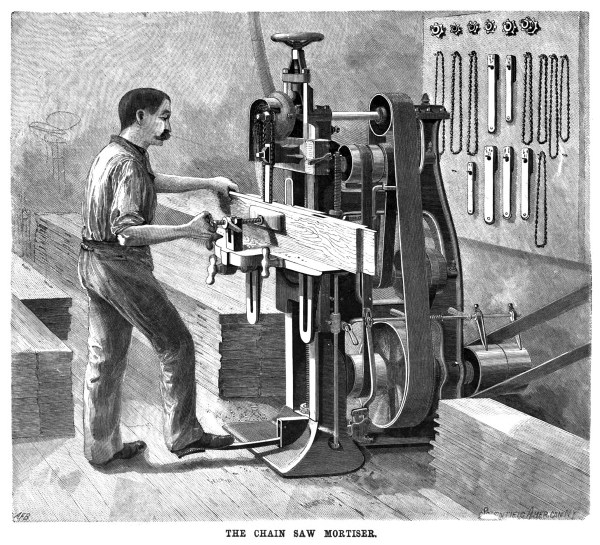
It is curious amid the day’s duties and continual bustle of woodworker’s life to watch, note and compare the different degrees of skill manifested by the various hands engaged at their machines. I say “degrees of skill,” because no two men possess and are gifted with the same inborn ability.
Casually looking at the mortiser hand, I was led to observe that his work lacked smoothness of motion. He lifted the pieces up with a jerk, shoved them on the fence with a rush, and threw them down with an air of “d— this work, anyway.”
Stepping over to his elbow I asked him ”was anything the matter, or was he not feeling well?” Really he seemed to be venting some spite on the harmless material which was passing through his hands, and judging from the way it was getting bruised and broken, he was succeeding nicely.
I picked up one of the soft pine door-stiles, and looking him straight in the face, asked him if he would be willing to replace that stile out of his week’s wages? Rather frightened, he asked, “Why, what is the matter with it?” “Do you consider that stile fit to go into a first-class door?” said I; “because I shall be obliged to replace it, as I do not consider it so.”
Continuing, I told him “if he did not exercise more care in passing his stuff through the machines, I should be obliged to dispense with his services the following Saturday.” As he knew I never warned but once, I was not surprised on next passing him to find he was passing the stuff through easily and piling it with the stiles in pairs, in a neat and workmanlike fashion.
Turning toward the north side, I stood to watch with pleasure the movements of one of our best men. In saying he is one of our best men I do not say by any means he is one of the most intelligent, as we have brighter and more skillful men; but there is a methodical and easy motion in the way with which he handles his stuff, and sets and adjusts his machine, thus getting a great deal of work done without any unnecessary haste.
To look at this man and his surroundings was really a pleasure, and an example which all wood-workers should follow. He was operating a jointer, using it as a sticker, as we were rushed with work. His stuff was all neatly piled to his left hand. It was in short lengths.
He never allowed the shavings to accumulate, but would occasionally sweep them into the conveying tube. As the stuff left the machine it was taken by a boy and piled in a similar pile at the farther end. To see him quickly and easily push that stock through was most edifying. He had a confident and easy manner in doing it, which showed the reliance he placed on his gear and its adjustment. His gauges were of wood and self-made.
Examining the molding as the pieces came out, I found the knives in good condition, as the molding was smooth, and would require but little sandpapering. He used four instead of two knives on head, thus insuring a clear and well-defined molding. Oak was the material, and I was struck with the fact that many knives were very effective in working hard wood.
I asked the man how a head with six sides would work. He said it would be a fine idea, but would scarcely be necessary, except to use with coarse or curly-grained woods, as maple, walnut, etc., but he said the more knives the better, even if they do take a little more time to adjust and keep in order.
I noticed this chap had also made a cover for his knife case, to keep out the dust, which was fitted with a lock and key, which he kept in a place known only to himself and the superintendent. I noticed also that this man had had the audacity to shore up the floor under his machine. He said it vibrated, and he didn’t believe in shaking the building to pieces. Really he showed his individuality in a marked manner, and was looked upon by his shop-mates as more or less of a know-all.
In the cabinet shops I found much carelessness rampant. I do not say disorder, because this was not existent; but regularity seemed to be absent. For instance, finished work was so placed that it was being bespattered with glue drops, and liable to become scratched by men carrying stuff in passing. The hot-box was in a sad state of repair, and was losing half its value by the heat escaping through the lid. And the horses and floor were dirty and grimy. This should never be permitted, and is due to negligence on the foreman’s part.
Some little faults and virtues like the above I noticed, but my casual survey was satisfactory and pleasing. There was a busy hum and rapid movement about the entire concern in all departments which denoted quick work, intelligence and want of delay. There was little or no talking and a general interest manifested by each man in his machine and its output. In many faces I saw thought and close watchfulness suggestive of invention or improvement. Taking everything I saw, I was convinced that the mill and its minds were doing their duties.
The Mechanical News – October 15, 1892
(originally from The Wood Worker)
—Jeff Burks